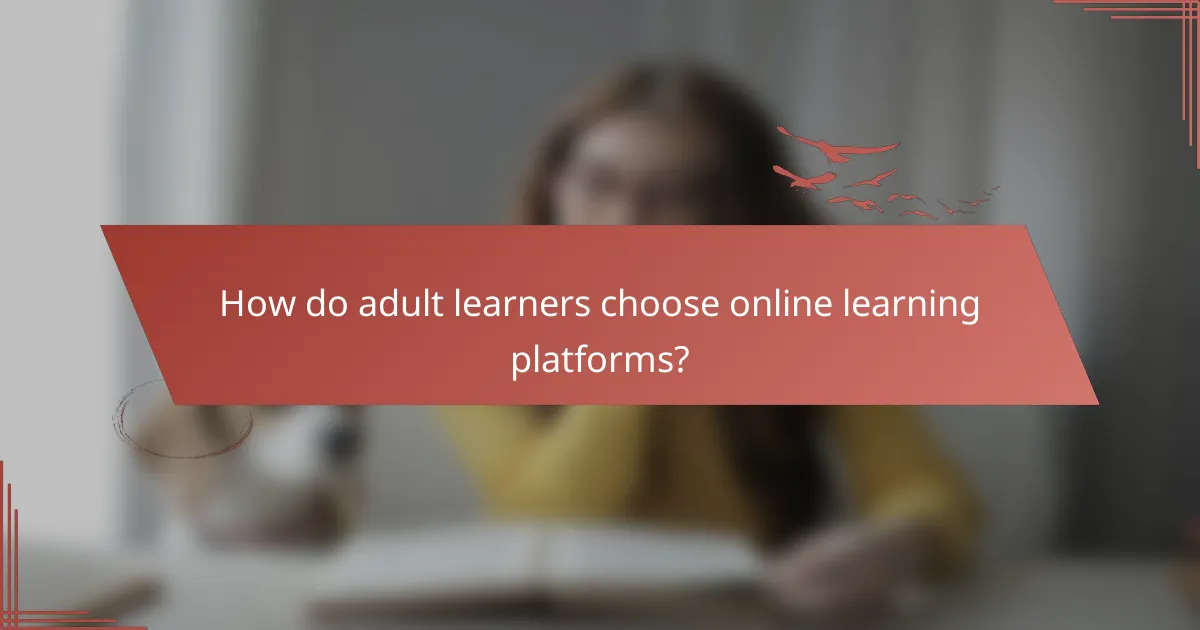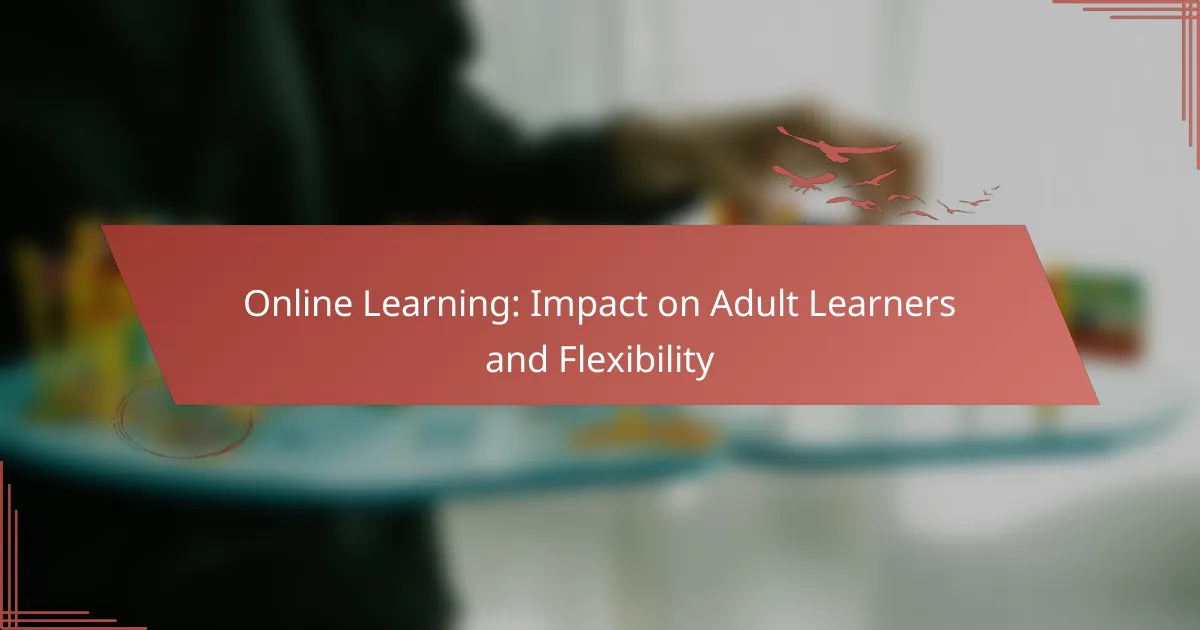Online learning has transformed the educational landscape for adult learners, offering them the flexibility to balance their studies with work and family commitments. This adaptable approach not only caters to individual schedules and learning styles but also enhances engagement and overall learning outcomes.

How does online learning impact adult learners in the United States?
Online learning significantly impacts adult learners in the United States by providing flexible access to education and tailored skill development. This mode of learning accommodates the diverse needs of adults balancing work, family, and education.
Increased accessibility to education
Online learning enhances accessibility for adult learners by removing geographical barriers and offering a variety of programs. Many institutions provide courses that can be accessed from anywhere, allowing individuals to study at their convenience.
This flexibility is particularly beneficial for those who may not have the time or resources to attend traditional classes. For example, adults living in rural areas can now enroll in programs offered by universities located hundreds of miles away.
Enhanced skill development opportunities
Online learning offers adult learners a wide range of skill development opportunities tailored to current job market demands. Many platforms provide courses in emerging fields such as data analytics, digital marketing, and cybersecurity.
Additionally, learners can choose from various formats, including video lectures, interactive quizzes, and hands-on projects, which cater to different learning styles. This variety helps adults acquire relevant skills that can lead to career advancement or transitions.
Improved work-life balance
Online learning contributes to a better work-life balance for adult learners by allowing them to schedule their studies around personal and professional commitments. This flexibility enables individuals to pursue education without sacrificing their job or family responsibilities.
For instance, many learners find they can complete coursework during evenings or weekends, making it easier to integrate learning into their daily routines. However, it’s essential to set clear boundaries and manage time effectively to avoid burnout.

What are the benefits of flexibility in online learning?
Flexibility in online learning allows adult learners to tailor their educational experiences to fit their individual needs, enhancing engagement and effectiveness. This adaptability can significantly improve learning outcomes by accommodating personal schedules, preferences, and learning styles.
Personalized learning pace
Online learning enables adult learners to progress at their own speed, which is particularly beneficial for those balancing work and family commitments. This personalized pace allows individuals to spend more time on challenging topics while moving quickly through material they grasp easily.
For example, a learner may choose to dedicate extra hours to complex subjects like mathematics while quickly reviewing familiar concepts. This self-directed approach fosters a deeper understanding and retention of knowledge.
Location independence
One of the key advantages of online learning is the ability to study from virtually anywhere, eliminating geographical barriers. Adult learners can access courses from home, a café, or while traveling, making education more accessible and convenient.
This location independence is especially valuable for those living in remote areas or those with mobility challenges. It allows learners to participate in programs that may not be available locally, broadening their educational opportunities.
Time management advantages
Flexibility in online learning supports better time management, as learners can choose when to engage with course materials. This control over their schedules enables adults to allocate time for studying around other responsibilities, such as work or family obligations.
To maximize this benefit, learners should create a structured study plan that includes specific times for coursework, breaks, and review sessions. This approach can help maintain motivation and ensure consistent progress throughout the learning journey.

How do adult learners choose online learning platforms?
Adult learners typically choose online learning platforms based on several key factors, including the institution’s reputation, the variety of courses offered, and the associated costs. These considerations help ensure that the chosen platform aligns with their educational and professional goals.
Reputation of the institution
The reputation of an online learning institution significantly influences adult learners’ decisions. Many prefer established universities or accredited organizations known for quality education. Researching reviews, alumni success stories, and industry recognition can provide insights into an institution’s credibility.
Additionally, learners should consider whether the institution is regionally or nationally accredited, as this can affect the transferability of credits and the value of the degree in the job market.
Course offerings and specialization
Adult learners often seek platforms that offer a wide range of courses and specializations relevant to their career paths. Platforms that provide flexible learning options, such as asynchronous classes or short-term certifications, can be particularly appealing. This flexibility allows learners to balance their studies with work and personal commitments.
It’s beneficial to review course syllabi, instructor qualifications, and the availability of hands-on projects or internships that can enhance practical skills. Some platforms may also offer tailored programs that align with specific industries, which can be a decisive factor.
Cost and financial aid options
The cost of online courses can vary widely, so adult learners should compare tuition rates and additional fees across different platforms. Many institutions offer financial aid options, scholarships, or payment plans that can make education more accessible. Understanding the total cost, including materials and technology fees, is crucial for budgeting.
Potential learners should also consider the return on investment (ROI) of their chosen program. Researching average salaries for graduates in their field can help assess whether the investment in education will yield significant career benefits.

What challenges do adult learners face in online education?
Adult learners encounter several challenges in online education, including self-discipline, technological barriers, and limited peer interaction. These factors can significantly affect their learning experience and outcomes.
Self-discipline and motivation issues
Many adult learners struggle with self-discipline and motivation when studying online. Unlike traditional classrooms, online courses require individuals to manage their time effectively and stay committed without direct supervision.
To combat these issues, learners can set clear goals, create structured schedules, and establish a dedicated study environment. Regularly reviewing progress can also help maintain motivation and accountability.
Technological barriers
Technological barriers can hinder adult learners’ ability to fully engage in online education. Issues such as inadequate internet access, unfamiliarity with digital tools, or outdated devices can create significant obstacles.
To overcome these challenges, learners should ensure they have reliable internet access and familiarize themselves with the necessary software before starting a course. Many institutions offer tutorials or resources to help students navigate technology effectively.
Limited peer interaction
Limited peer interaction in online education can lead to feelings of isolation among adult learners. The lack of face-to-face communication may reduce opportunities for collaboration and networking, which are often vital for personal and professional growth.
To mitigate this, learners can participate in online forums, join study groups, or engage in virtual meetups. Actively seeking out connections with peers can enhance the learning experience and foster a sense of community.

How does online learning compare to traditional education for adults?
Online learning offers adults greater flexibility compared to traditional education, allowing them to balance studies with work and personal commitments. While both methods aim to educate, the approach and structure of online courses can significantly differ from in-person classes.
Flexibility vs. structured environment
Online learning provides a flexible schedule, enabling adult learners to study at their own pace and choose when to engage with course materials. This is particularly beneficial for those juggling jobs, family responsibilities, or other commitments.
In contrast, traditional education typically follows a fixed timetable, requiring attendance at specific times and locations. This structured environment can foster discipline and routine but may not accommodate the varied schedules of adult learners.
Cost-effectiveness of online courses
Online courses often present a more cost-effective option for adult learners compared to traditional education. Tuition fees for online programs can be lower, and students save on commuting and housing costs associated with attending in-person classes.
However, it’s essential to consider the potential hidden costs of online learning, such as technology requirements and internet access. Adult learners should evaluate their budget and ensure they have the necessary resources to succeed in an online format.
